The Road
People ask me where I’m going. I tell them, “I don’t know.”
In Middle English, it was “rode” and in Old English, “rad,” which translated to “riding expedition, journey, hostile incursion.” We have examples from Proto Germanic (raido) Old Frisian (red), Old Saxon (red), Middle Dutch (rede) and others. Etymologists think the path to its current definition is a bit obscure, but its meaning as “an open passage or way for traveling between two places” was established by the 1590s. As an aside, “road hog” has been in usage since 1886, “road rage” since 1988, “road map” since 1786 and “road trip” since 1950, (a term which originally applied to baseball teams.)
For synonyms, we get “arterial, boulevard, drive, high road, row, thruway, way, artery, highway, roadway, street, trace, avenue, drag, freeway, pass, route, thoroughfare, turnpike” and others.
I have no serious qualifications I can trot out. I was a lowly English major at college and would write papers about Jimi Hendrix for the pure freak joy of subjecting my professors to discussions of psychedelia in academic language. I am not a professional philologist, but I am an ardent amateur. I have read widely and consistently my whole life. And while I am not certified to expound reliably on anything, I have driven hundreds of thousands of miles, often with no clearcut destination, on a great number of roads in the United States and in other countries. I have taken the high road, the low road and the middle road. I have thought a lot about the road - in both literal and figurative terms. In fact, I have been obsessed with the road since long before I could drive.
The road is a path and a destination. The road is a state of mind. The road is a goal to aspire to. The physical road can be a gateway to change. The road itself is a state of transition. The road changes. The road will change you. On the road, you meet others from different places, different dimensions. You meet others in a state of change. The road is a path for seekers. The road is a path for pilgrims. The road is a melting pot, a leveler and a meat grinder.
The road is built by humans along rights of way determined by human need, by human circumstance. There is always an initial reason for a road. From the Romans to Eisenhower, there were always sound military and commercial needs. They were not built for people to wander on. That was a by-product. Once a road existed, people could rouse themselves up and wander. Actually, it’s not that easy. You need to have the time and freedom from serious responsibility in order to wander the roads. You can live on the road, but it’s a hard life. It’s easier to live in one place, although living in one place can bury you. The road needs nobody to call it home. The road offers a way out. It also offers a way back.
The road is another kind of limbo.
“I’m going to hit the road” means something different to everybody. Some people simply see a long drive, something to be endured, a real drag. It might be punctuated by memories from their youth - the Holiday Inn, the Motel 6, the fast food restaurants that shimmer off the exits. But it’s a waste of time for many, and that’s fine. There’s not enough room for everyone to be on the road at the same time. That would be an emergency evacuation and it’s not pretty. Some people need to wander and others need to stay home and it’s not something as clearcut as you might think. It’s not always intuitive. It’s more of a calling. Look at the lyrics to “Lost Highway.” Read Kerouac, Homer, Twain, Herodotus and others. One day, you just have to pick up and go.
Restless people have gone out searching since time began. They may not even know what they’re looking for. What’s over the next hill? Around the next curve? Do we stop or keep going? Where does the day end? Who do we meet along the way? When do I outrun my feelings? What about the life I normally lead? Will I find peace? Will I find agitation on the road? WHAT WILL HAPPEN NEXT? The road can be a state of uncertainty. “What happens next” - the overriding animus behind every great story. The road is a story. We write the plot line every day and it can change or we can erase it and start over on a daily basis.
The road is a place to meet strangers.
I’ve got stories, as Colonel Frank Spade threatens in “Scent of a Woman.” Or as any other writer might threaten people. Let me tell YOU something. I have met people on the road and we have spoken to each other, we have exchanged words and then moved on. Many of the people you meet on the road will share a few moments with you and it’s understood you’ll never meet again. This kind of talk can generate supreme banalities or brief flashes of deep connection, to be lost an hour later. The road is about time and space and intersections with strangers.
I stopped for gas once at a Conoco station in Gallup, New Mexico. There was a guy at the next pump. People would often start up conversations with me because of the tricked-out van I drove for all those years. HE said, "It's pretty clean looking for an off-road vehicle." To which I responded, "Well, give me a week." I added, "I'm just coming from New York." And he said, "Where you going?" I responded, "May end up in Alaska. But you know, we'll see."
He adjusted his cap and said, "I just got back from Baja. Don't believe everything you hear about Baja in the papers. It’s not like the rest of Mexico. There's not a lot of violence. It’s safe." Blah, blah, blah. They all say that. We talked for a minute, and then I went in. I bought some gallon jugs of water and some Fig Newtons. When I came out, he was still filling his little car. I asked him, "Where do you live now?" He proceeded to tell me that he had a place - he pointed with his whole arm, "That way."
He seemed to indicate somewhere in New Mexico, maybe near Gallup. That was his place in the states, but for seven months out of every year he lived in Baja. He said he had been bumming around down there since 1955, when he got out of the Air Force, where he had been a pilot. He didn't look that old, although he could've been in his mid 70s, so maybe he was telling the truth. He looked to be in good shape. He told me he had been in law enforcement for 35 years. The numbers might have added up. He said he had grown up in California. His parents had been settlers in Southern California, but he got out of there and the state “had changed a lot.” He talked about the need to carry a gun when you travel like this, on the open road. I replied, “I'm from New York City. I can't own a gun."
Predictably, he said, "I would never live there." Then he described the house in Baja where he lived seven months of the year. He said he had built it himself and that you could be 50 yards from it and not know it's there. “It's very low-key. I like keeping a low profile. There's mesquite trees all in front of it, and it's built into the side of a mountain." The walls were 18-inch-thick concrete and the bedroom was 17 feet below grade level. He repeated that he kept a low profile. ”Americans who move there and build an expensive castle on top of a hill must wonder why, you know, they have problems." He said his place was so well insulated that you could heat it all winter on two wheelbarrows full of mesquite wood.
I began to wonder how much was fantasy and how much was reality. With some people, you get an idea pretty quickly, but he was convincing and he kept coming back to the need to be armed. He was really glad that he had a place to retreat to, his fortress of solitude. When we finished up, he pulled a bullet casing out of one of his rear jean pockets. He kind of mumbled, "I got the other half in the other pocket.” Told me he had just gotten his hair cut for the first time in seven months. And that was it. We had a pleasant chat and I said, "Goodbye, good to meet you." He responded, somberly, "Good luck."
I pulled away from the pump, put on my turn signal, angled towards the interstate and thought about this guy. He was a stereotype that I have run into often. Heavily into guns and prepping and the need to talk about it. Always alluding vaguely to military and law enforcement background, a hideaway in the desert, admonitions against living in New York and California. I have had variations on that same conversation with dozens of guys out west at gas pumps and truck stops and campgrounds. And there is always the chance that it’s all true - at least when it comes to the guns. I’m not as certain about the military background stuff. Most combat vets I know don’t talk about it much. But I’m sure these guys are all armed. I got back on the road and came up to highway speed.
There’s something powerful about getting in a car, sliding behind the wheel and leaving home. You take the destination into your own hands. When people ask me where I’m going, I tell them, “I don’t know.” They will ask again where I’m going and they are incredulous and often unable to accept my answer of, “I don’t know.” I will add something like, “I’m probably heading west, maybe south. I may come back tomorrow. It may be a week, maybe two.” That’s just the way it goes.
Is the need to explore some primal urge? This whole diatribe was prompted by something I read in a forgettable article a week ago. Some anonymous author on some forgettable topic used the forgettable phrase, “the road to recovery.” And, having experienced some long physical recoveries in life, I can appreciate the turn of phrase. But it got me thinking about the road. Or should I start to refer to it as “The Road,” an amorphous, very physical entity unto itself? I read once that the U.S. Interstate System is the largest human-made thing on earth. It may be, but it’s far from the only road. I used to hate the interstate. I’m okay with it now. It has its uses, although scenery and the ability to meet strangers are secondary to speedy travel. Still, if your eyes are open, you can find stuff on the interstates. You might even find yourself.
Some road trips are planned. Some are open-ended and evolve. They take their own course. Some will change you, others will make you realize who you already were. Any journey brings risks. You don’t have to know what you’re doing. You don’t have to be looking for anything. All you need is to find a car or some other vehicle and get some time off from your life. And sometimes that’s the hardest part.
There are other ways to travel. You can travel by sea or by air. They both involve a journey but, it goes without saying, they are not road trips. They take something out of the equation. A plane or a boat can lead to a road, but they don’t move over the land. I have a friend who’s addicted to air travel - he loves being in a plane and I can understand it. I wish I could have taken the Concorde when it operated. The idea of getting on a plane in New York and landing in Paris or London a few hours later is seductive. The whole idea of changing our surroundings and perspective completely is powerful stuff. The road is like that, but it’s slower. There’s more time for it to soak in. Sun Ra and his Arkestra used to chant, “We travel the spaceways from planet to planet…” over and over. That’s all that they needed to say. Endless strange movements through different galaxies. Drifting.
Roads can be legendary, sometimes simply for their scenery. But what is scenery and why does it matter? The Pacific Coast Highway, the Blue Ridge Parkway, the Alaska Highway, that insane road to Labrador I once traveled, the trans-Siberian highway. What is it about staring at this alien landscape? What does it do beyond just taking us out of our daily humdrum? The people who live along these roads, do they get the same experience every day or do they go someplace else for their own scenery? Or do they not need to?
“I’m going to hit the fucking road.”
“On the Road,” by Kerouac. I read it as a kid. I was 12 and bought a crappy paperback copy at the Princeton University Bookstore. We lived near the campus for two years when I was a kid. I would ride the campus paths on my bicycle. Then I discovered the bookstore. It was an amazing and difficult time for me. I was lonely and alone, missing Yonkers, where I had grown up. Princeton was where I discovered comic books and the great Russian authors. I read “On the Road” and wanted to be there, wanted to be in the car with Dean and Sal and Carlo, heading crazily on a whim into the ether, on the way to visit old Bull Lee. I just wanted my freedom and the road seemed like a way out. I was a few years away from getting my driver’s license, let alone a car. It felt like there was no way to break free from my proscribed path in life, forget about taking crazy drives just for the sake of it. That would come later. For now, at least, I could go there in my head, in my own construct of what the road might be. My imagined road. My fantasy road.
That book did not shape my psyche, but it did show me a path. It described a wander on the relatively new American highway system. The only road I knew at that point, aside from the local ones between New York City and Yonkers, was the highway to either New Jersey, upstate New York or Cape Cod. And my only experience of the road then was from the back seat of our Oldsmobile, where I would glue my nose to the cold, hard window and watch the world go by to the low hum of my parents talking in the front. There was no agency and no psychic room for me to enjoy it. I did enjoy pulling into the parking lot of a Howard Johnson’s for an ice cream cone, but we did not stop much on these trips and we only took a vacation once a year, in the summer.
I didn’t get a chance to really hit the road until I was in my late 20s. It was almost an accident. I was set up, in the slot, for a circumscribed life - a job with two or three weeks off a year, along with a wife and I don’t know what else. It was a vision of the future that I just did not have, but probably similar to what my parents had created for themselves - something safe with the occasional four-hour drive to someplace in the Northeast, where I would spend 12 days recovering from the previous 50 weeks of work.
At the time, I was driving a truck for a living, delivering cakes and pastry in Manhattan, Brooklyn and Queens, and a short road trip was truly a busman’s holiday for me. Still, I knew what I wanted to do and I did it. One October day in 1990, my then-wife and I set off on a trip to Washington D.C in my dad’s Ford Taurus, which he had lent us for the long weekend. This was before the internet existed for most people, so we would listen to the TV or radio or buy newspapers. It wasn’t until we got to D.C. that we learned the government had shut down. This was my only two weeks off for the year, so we could not turn back. We kept on driving.
We headed to Virginia Beach via Assateague State Park. I had spent my whole life in either Yonkers, Princeton, Manhattan or Cambridge, Massachusetts. I was remarkably ignorant of United States geography. Whatever I knew came from books, movies and popular music. I thought Virginia Beach was a little fishing town with a motel strip. We got there and were overwhelmed by the size of it, the psycho vacation energy and the noise. We stayed a night and decided to move on. Myrtle Beach seemed like it might also be a little fishing town, so we headed there, only to discover the same vibe. It was not what we were looking for. I had no idea what we were looking for, but I knew that was not it. Florida began to seem like a good idea.
Again, we set out south, heading for the ocean and, hopefully, some quaint little town. There was a promise of change and exoticism as we crossed the state line and headed to Orlando. Why did we chose Orlando? Disney? The old warbirds airplane museum there? I don’t remember. Either way, I discovered it was not on the ocean, but only after we got there. Did I have a road atlas? I must have, but again I don’t remember. We stayed for a few days and had some kind of a time. By then, though, I had realized that I really liked to drive. I liked to kick it around on the road. The rest stops, shitty restaurants, relentless mile after relentless mile. I don’t remember what my wife thought about it, but I was hooked. We hauled ass back - which I also enjoyed - and the bug had been planted in my head. I had fallen in love with the road.
The road widens, it curves. It narrows and disappears. And it can end. Trips also end, but the road endures. The road defines the edges and it cuts through the center. It goes between places and it is the place. You can go on the road, over the road and next to the road. You can ride the road. You can get road sick. You can be covered with the road and even disappear on the road. You can take the long road and you can take the short road. You can get stuck on the road and you can get lost on the road.
My hot spring soaking buddy once told me, “You’re not out there for the photography or the hot springs. You’re out there for the food.” He was only half kidding and only half wrong. I do like the food on the road. Whether it’s some crappy fast food at the end of a long day or a strange local delicacy, like a special pie in the Intermountain West or a bowl of thick gumbo in Louisiana or some tasty Mexican food in Los Angeles or any of the million different things you can only get in one particular place, I like to eat on the road. Things taste better when I eat them on the hood of my car or at a picnic table by some dusty truck turnaround.
But it’s not just the food - it’s the wind on my face at a small desert crossroads. It’s finally getting over that last range and seeing and smelling the Pacific. It’s the birds that circle the high peaks and the low valleys. It’s the perfectly preserved - or imperfectly preserved remnants of small city centers from the 20th century. It’s living each day in some universe that’s not my usual one. It’s the exoticism of the deep South, the majesty of the Great Plains, the drama of the high desert, and the mystery of the Pacific Northwest forests. I can’t think of a sweeping description of the Northeast, but that’s only because it’s home and it’s harder to put it into words. So yeah, it’s the food and the wind and the birds and the trees. But it’s also the people.
Statistics say you’re more likely to get into an accident close to home, and that may or may not be true about driving, but I feel more emotionally vulnerable out on the road, far from the comforts, safety and familiarity of home. Maybe that’s as it should be. Maybe you need to open yourself up in order to feel anything. It gets harder to leave the safety of the cave. The older I get, the harder it gets to break that force of gravity and get behind the wheel. The urge to be *out there* does not diminish, but the sense of mortality is stronger. Mortality becomes something I need to push through.
At the risk of pithiness, life is the ultimate road, and it’s one we’re on whether we like it or not. As I descend into babble and platitudes, I contemplate the idea of action. Take an action, put yourself in gear and drive. You may have a plan, but unexpected things will happen. The important thing is to be moving. And yes, there are times when it’s important to be still and to sit, listen, and breathe, but without some kind of motion, what is there?
We travel on our roads. Sometimes we travel with someone and sometimes we go alone. Strangers travel on the same roads. They exit and enter the road at different points. We can witness them on the road if we choose.
The road is filled with mystery and dread. It can also hold magic. And there’s no way of knowing what’s out there. You can’t do it from your computer or your phone - you need to actually go. You need to get dusty and wet and dirty and tired. You have to cooperate with the road. With whatever and wherever it sends you.
You can always contribute any amount to Juke using these Venmo and Paypal links:
Paul Vlachos is a writer, photographer and filmmaker. He was born in New York City, where he currently lives. He is the author of “The Space Age Now,” released in 2020, “Breaking Gravity,” in 2021, and the just-released “Exit Culture.”


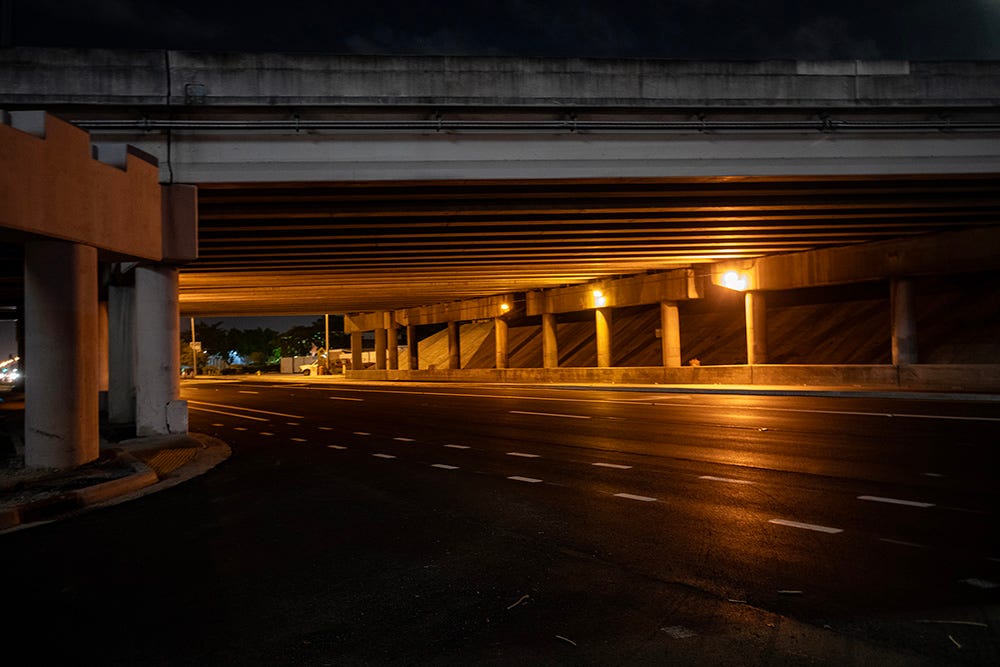
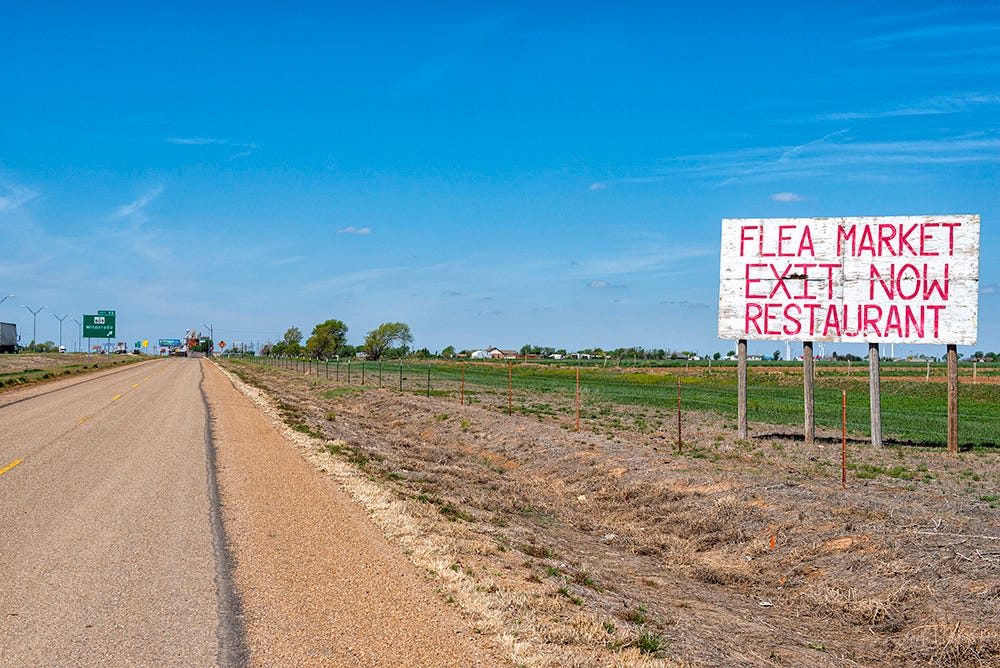
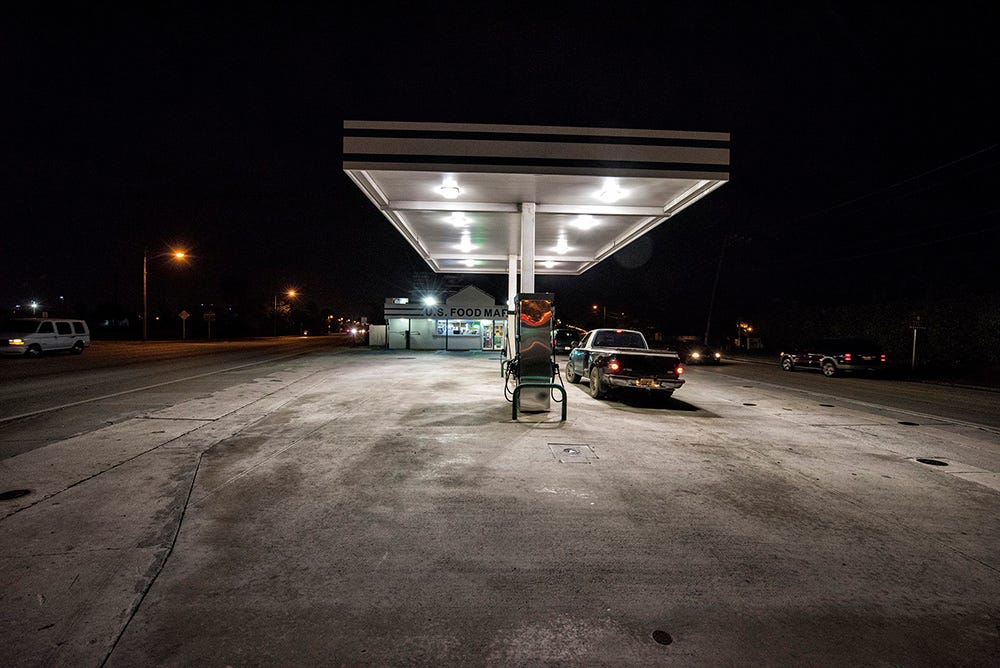
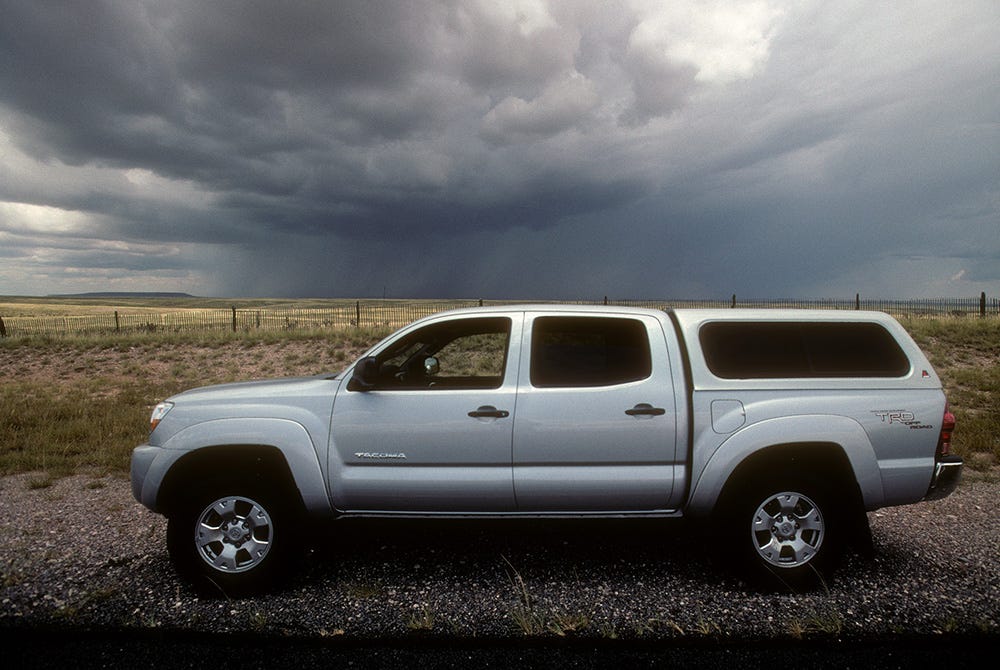
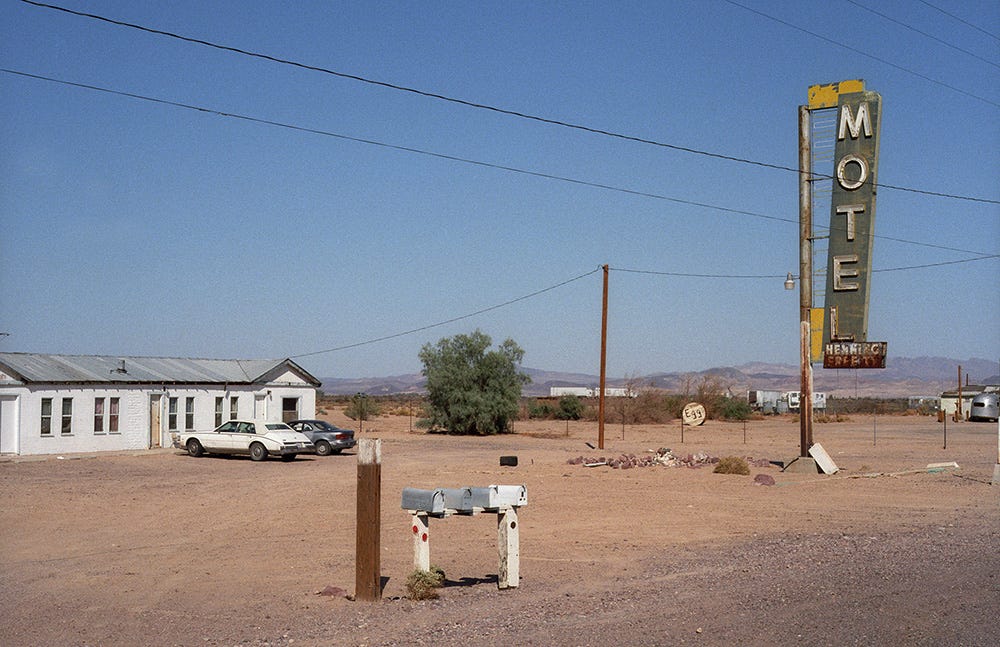
this was a wonderful read, Paul. thank you.
Your hunger for the road and all it offers is what I've craved and indulged in for decades. At different periods in my life, I've hit the road, but the purpose seems to be the same - to get the hell away. You're right, though, the older one gets, the harder it is to leave the cave. But leave the cave I must and I'm amazed that my husband is getting that same itch every Sunday. He was a marathon commuter in our early days together, so a Sunday drive was an onus. Now, as a remote worker, with fix-it projects and yard work piling up around his shoulders, he NEEDS that Sunday drive. To get the hell away, just for a few hours. After a few years, the scenery is the same with subtle changes for the seasons. But by the time we turn around to come home, it's TIME to come home. Return to the cave. Yet there are many desert roads left to explore should we have the gumption to drive in the Jeep instead of the Subaru. Adventure over comfort (and the drowsiness that overtakes us). I love this essay of yours today, Paul. It speaks to me on so many levels and distracts me on some many tangents. Bravo!